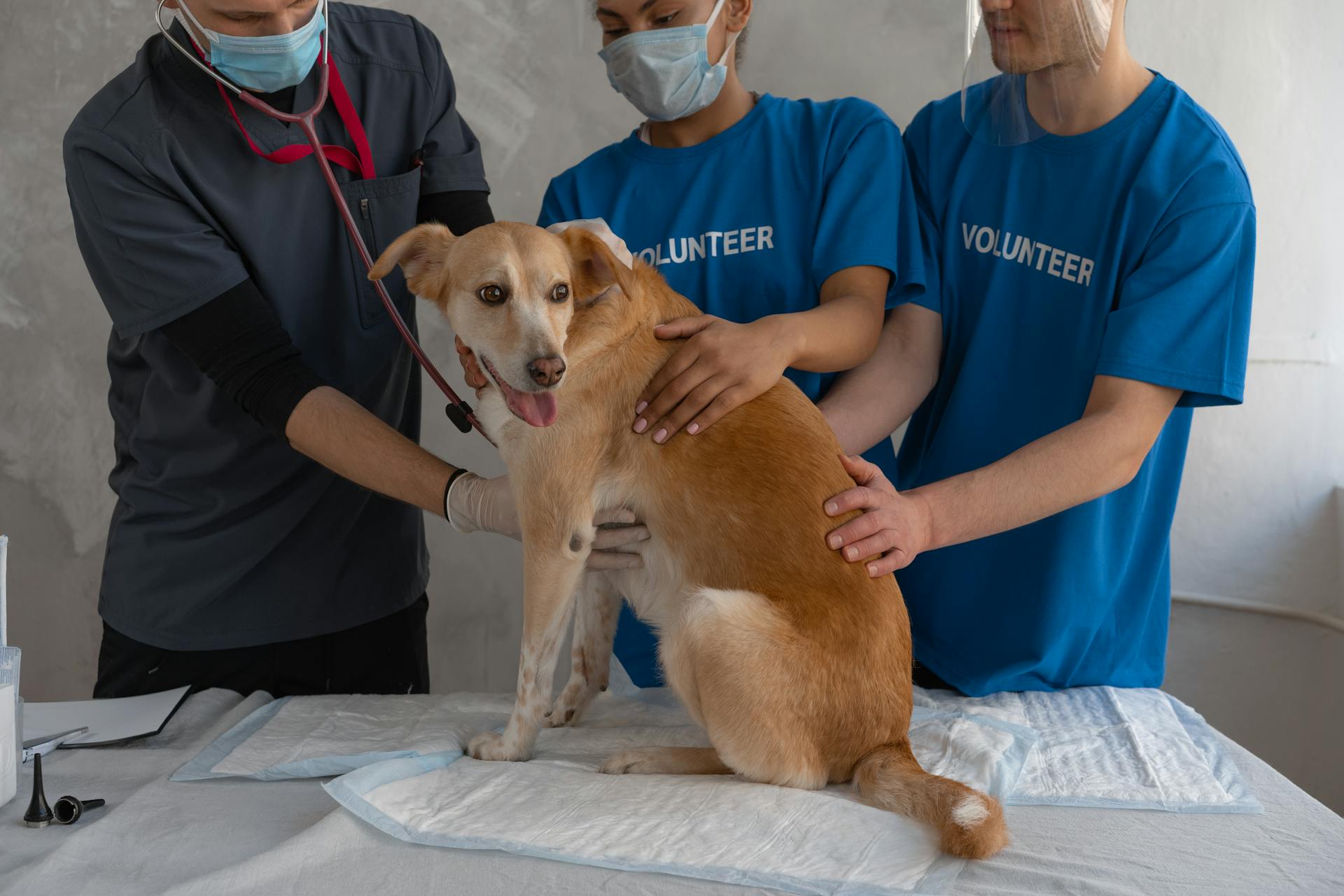
Kennel cough is a highly contagious respiratory disease that affects dogs, caused by a type of bacteria called Bordetella bronchiseptica.
The disease is spread through the air when an infected dog coughs or sneezes, releasing the bacteria into the air.
Symptoms of kennel cough include a persistent, hacking cough, runny nose, and discharge from the eyes.
The cough can be so severe that it can lead to pneumonia in some cases, which can be life-threatening if left untreated.
Prevention is key, and one of the most effective ways to prevent kennel cough is by getting your dog vaccinated against the disease.
Curious to learn more? Check out: Kennel Cough Bacteria
What is Kennel Cough?
Kennel cough is a highly contagious respiratory infection that affects dogs, causing a harsh, hacking cough that can be quite distressing for both the dog and its owner.
The primary cause of kennel cough is the bacterium Bordetella bronchiseptica, which is often spread through contact with an infected dog's saliva or mucus.
This bacterium typically attacks a dog's upper airways, leading to inflammation and irritation, which in turn causes the characteristic cough.
Dogs are most susceptible to kennel cough when they're exposed to large groups of other dogs, such as in kennels, dog parks, or training facilities.
Kennel cough can also be triggered by other factors, including stress, fatigue, and exposure to pollutants like dust and smoke.
Symptoms of kennel cough usually appear within 5-14 days of exposure to the infection, and can range from mild to severe, depending on the individual dog's health and immune system.
In some cases, kennel cough can lead to secondary bacterial infections, which can worsen the symptoms and prolong the recovery time.
A different take: How Long for Kennel Cough Symptoms to Show
Causes and Contributing Factors
Kennel cough is a complex illness, and it's often caused by a combination of factors. The bacterium Bordetella bronchiseptica is the most common culprit, but it's not the only one.
Dogs can contract kennel cough at places where other dogs congregate, such as boarding kennels, dog daycare facilities, dog parks, and dog shows. This is because kennel cough is highly contagious and can spread through airborne droplets, direct contact, or contaminated surfaces.
In addition to Bordetella, other pathogens like canine parainfluenza virus, canine adenovirus type 2, and canine influenza virus can contribute to kennel cough. These pathogens can be found in the air, on surfaces, or on other dogs.
Some dogs are more susceptible to kennel cough, including puppies younger than 6 months old and dogs with weakened immune systems. These dogs may experience more severe symptoms and a longer recovery time.
Here are some common organisms that can contribute to kennel cough:
- Canine parainfluenza virus*
- Canine adenovirus type 2*
- Canine influenza virus (subtypes H3N2 and H3N8)**
- Canine respiratory coronavirus
- Canine herpesvirus-1
- Canine distemper virus*
- Bordetella bronchiseptica**
- Mycoplasma species
- Streptococcus equis subspecies zooepidemicus
*Protection available through standard vaccines.
**Protection available through additional vaccines.
The good news is that kennel cough is highly treatable in most healthy adult dogs, but it's essential to seek veterinary care if your dog is showing symptoms.
Symptoms and Diagnosis
Symptoms of kennel cough can be pretty obvious, but it's essential to know what to look out for. If your dog has kennel cough, you may notice a strong cough, often with a "honking" sound, runny nose, sneezing, lethargy, loss of appetite, or a low fever.
If you suspect your dog might have kennel cough, it's a good idea to first call your veterinary clinic and describe any signs you've noticed before taking your dog in to be seen. This will help prevent infecting other patients.
A veterinarian will make a "presumptive" diagnosis of kennel cough by thoroughly examining your dog for signs of illness, ruling out other causes of cough, and asking questions about exposure to other dogs or multiple-dog settings.
Consider reading: Early Signs of Diabetes in Dogs
What Are the Symptoms of?
If your dog is coughing, it's essential to pay attention to the symptoms and take them to the vet as soon as possible. The most obvious symptom of kennel cough is a strong cough with a "honking" sound.
Runny nose, sneezing, lethargy, loss of appetite, and low fever are also common symptoms of kennel cough. These symptoms can be concerning, but they're often treatable in healthy dogs.
A strong cough with a "honking" sound is the most obvious symptom of kennel cough. Other symptoms include runny nose, sneezing, lethargy, loss of appetite, and low fever.
Here are the common symptoms of kennel cough:
- Strong cough with a "honking" sound
- Runny nose
- Sneezing
- Lethargy
- Loss of appetite
- Low fever
It's essential to report any coughing symptom to your veterinarian because it could be a sign of a more serious disease. Dr. Kevin Fitzgerald, a veterinarian, warns that symptoms of kennel cough can be identical to those of canine distemper virus and canine influenza virus.
Additional reading: Canine Distemper Infection
How is CIRDIC Diagnosed?

Diagnosing CIRDC typically starts with a visit to the veterinarian, who will ask about signs of illness and potential exposure to other dogs or multiple-dog settings.
The vet will examine your dog thoroughly to look for signs of illness and rule out other causes of cough. They may also consider whether other dogs in the area have been affected.
If your dog has mild CIRDC, they may improve quickly without needing any diagnostic tests. The vet will make a "presumptive" diagnosis based on the examination and questioning.
However, if multiple dogs are affected or your dog is getting worse despite treatment, testing is recommended. The vet will collect swab samples from the throat, nose, and/or edges of the eyes for lab testing.
Lab testing can confirm infection and identify the specific bacteria or viruses involved.
Intriguing read: Lab Dog Teeth
Treatment and Prevention
Treatment for kennel cough depends on the severity of the illness, with mildly affected dogs typically recovering with basic supportive care and plenty of rest. This means avoiding excitement and neck leashes to prevent further irritation.
Dogs with more severe illness may benefit from nonsteroidal anti-inflammatory medications and fluids to reduce fever and inflammation and treat dehydration. Antibiotics are not usually necessary unless there are signs of bacterial pneumonia, such as illness lasting more than 10 days.
Preventing kennel cough is possible with a vaccine available for the bordetella bacterium, the most common cause of kennel cough. The vaccine is usually given in two doses two to four weeks apart, followed by a booster every six months to a year.
On a similar theme: Dog Illness Grooming
How is it Treated?
Treatment for CIRDC and kennel cough is quite similar. Most dogs with mild cases will recover quickly with basic supportive care, such as rest and avoiding situations that irritate their airways.
This means giving your dog plenty of time to rest and avoiding excitement and neck leashes, which can exacerbate the condition.
Antibiotics are usually not necessary unless there are signs of bacterial pneumonia, including illness that lasts more than 10 days.

Your vet may prescribe antibiotics to prevent secondary bacterial infection, as well as cough suppressant medication to ease symptoms.
It's also helpful to use a dog harness rather than a collar when walking your dog, as irritation of the tracheal area can aggravate the cough.
Dogs with more severe illness may benefit from nonsteroidal anti-inflammatory medications to reduce fever and inflammation, and fluids to treat dehydration.
Preventing Canine Illness
Keeping your dog's vaccines current is the best way to protect them against Canine Infectious Respiratory Disease Complex (CIRDC). Vaccines not only reduce the chance of your dog becoming ill, they also make your dog less likely to develop severe disease or spread the infection to other dogs.
Many facilities and events where dogs are gathered require proof of certain vaccines. Your veterinarian will help you decide which vaccines your dog needs to stay healthy.
Dogs can be contagious and still look perfectly healthy, so it's essential to stay informed about places or geographic regions where CIRDC has been reported. Your veterinarian or online resources can provide you with this information.
Recommended read: Healthy Mind Canine - Separation Anxiety Training
If you plan to introduce your dog to a group of new dogs, consider getting them vaccinated against kennel cough, especially if they frequently board, visit dog daycare, or compete in canine sports. The vaccine is usually given in two doses two to four weeks apart, followed by a booster every six months to a year.
Here are some additional tips to help prevent the spread of CIRDC:
- Keep your dog away from toys and food and water bowls used by dogs outside your household.
- Delay or avoid travel with your dog to places where outbreaks are occurring.
Spread and Precautions
Dogs can spread kennel cough to each other through airborne droplets, direct contact, or contaminated surfaces. This is especially true in areas where many dogs congregate.
Places like boarding kennels, dog daycare facilities, dog parks, and dog shows are high-risk areas for kennel cough transmission. You can also catch kennel cough at dog-friendly breweries, cafes, or other public places where dogs are present.
To minimize the risk of kennel cough, veterinarians recommend taking common-sense precautions like avoiding contact with sick dogs and keeping your dog's vaccinations up to date. If you're concerned about exposure, it's a good idea to steer clear of crowded settings like dog parks and boarding facilities.
How Kennel Cough Spreads in Dogs
Kennel cough is highly contagious among dogs that gather in the same places. These places include boarding kennels, dog daycare facilities, dog parks, dog training groups, and dog shows.
Dogs can spread kennel cough to one another through airborne droplets.
Direct contact, such as touching noses, is another way kennel cough is spread.
Contaminated surfaces, including water or food bowls, can also carry the bacteria.
Recommended read: How Is Kennel Cough Contracted
Balance Precautions and Fear
As you consider precautions to take for your dog, it's essential to strike a balance between caution and fear.
Taking common-sense measures, such as avoiding contact with sick dogs and ensuring your dog is up to date on its vaccine, is a good starting point.
If there are a lot of sick dogs in your area, it's reasonable to be more restrictive with your dog's activities.
You may want to steer clear of high traffic public places like dog parks, as well as boarding facilities, groomers, and other crowded settings.

These are the activities where dogs with different backgrounds and immunization levels mix, increasing the risk of exposure.
However, avoiding routine health care for your dog is not the solution.
In fact, if your pet does get sick, it's crucial to get them seen immediately, as delayed treatment can lead to more severe consequences.
Here are some key precautions to keep in mind:
- Keep your dog's vaccinations up to date.
- Avoid contact with sick dogs.
- Steer clear of high traffic public places like dog parks.
- Get your dog seen immediately if they show symptoms of illness.
Frequently Asked Questions
How did my dog get kennel cough without being around other dogs?
Your dog may have gotten kennel cough from airborne droplets or by coming into contact with contaminated surfaces, such as toys or food and water bowls, that were previously exposed to the virus
What is the difference between kennel cough and mystery illness?
Kennel cough and mystery illness differ in their treatment outcomes, with kennel cough usually resolving with proper treatment, whereas the mystery illness may not respond to standard treatments. This distinction highlights the unique characteristics of each condition.
Sources
- https://news.virginia.edu/content/qa-what-know-about-mysterious-dog-illness-sweeping-country
- https://today.umd.edu/a-mysterious-illness-is-spreading-among-dogs-nationwide-heres-what-you-need-to-know
- https://www.npr.org/sections/health-shots/2023/12/01/1216209026/dog-respiratory-illness-mystery-cause-symptoms-research
- https://www.avma.org/resources-tools/pet-owners/petcare/canine-infectious-respiratory-disease-complex-kennel-cough
- https://www.akc.org/expert-advice/health/kennel-cough-in-dogs/
Featured Images: pexels.com


